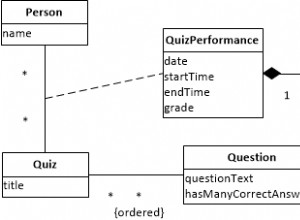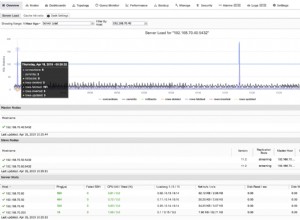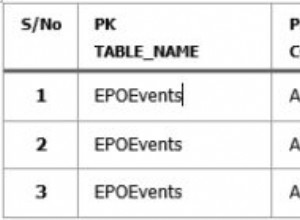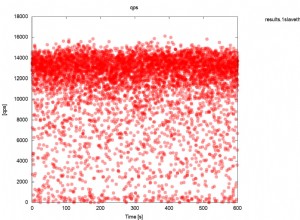Basierend auf der Lösung mit regexp split Sie können die folgende Abfrage ausführen.
Beachten Sie jedoch, dass Sie die maximale Anzahl der resultierenden Spalten im Voraus kennen müssen.
with t1 as (select 1 rn, 'Orcl, orcl, linux box, Pass, tablespace_name1, tablespace_name2' col from dual union all
select 2 rn, 'Orcl2, orcl2, linux box2, Pass2, tablespace_name12, tablespace_name22' col from dual),
t2 as (select rownum colnum from dual connect by level <= 6 /* (max) number of columns */)
select t1.rn, t2.colnum, rtrim(ltrim(regexp_substr(t1.col,'[^,]+', 1, t2.colnum))) col from t1, t2
where regexp_substr(t1.col, '[^,]+', 1, t2.colnum) is not null
order by rn,colnum;
Dadurch erhalten Sie die Zeilen-, Spalten- und Schlüsselansicht:
RN COLNUM COL
----- ---------- ------------------
1 1 Orcl
1 2 orcl
1 3 linux box
1 4 Pass
1 5 tablespace_name1
1 6 tablespace_name2
2 1 Orcl2
2 2 orcl2
2 3 linux box2
2 4 Pass2
2 5 tablespace_name12
2 6 tablespace_name22
Sie können die PIVOT-Abfrage verwenden, um das Ergebnis in einer flachen Tabelle zu erhalten
with t1 as (select 1 rn, 'Orcl, orcl, linux box, Pass, tablespace_name1, tablespace_name2' col from dual union all
select 2 rn, 'Orcl2, orcl2, linux box2, Pass2, tablespace_name12, tablespace_name22' col from dual),
t2 as (select rownum colnum from dual connect by level <= 6 /* (max) number of columns */),
t3 as (select t1.rn, t2.colnum, rtrim(ltrim(regexp_substr(t1.col,'[^,]+', 1, t2.colnum))) col from t1, t2
where regexp_substr(t1.col, '[^,]+', 1, t2.colnum) is not null)
select * from t3
PIVOT (max(col) col for (colnum) in
(1 as "1",
2 as "2",
3 as "3",
4 as "4",
5 as "5",
6 as "6"))
order by rn;
RN 1_COL 2_COL 3_COL 4_COL 5_COL 6_COL
----- --------- --------- --------- --------- --------- ---------
1 Orcl orcl linux box Pass tablespace_name1 tablespace_name2
2 Orcl2 orcl2 linux box2Pass2 tablespace_name12 tablespace_name22
Auch hier müssen Sie, wie Sie sehen, alle resultierenden Spalten in der Abfrage auflisten.




